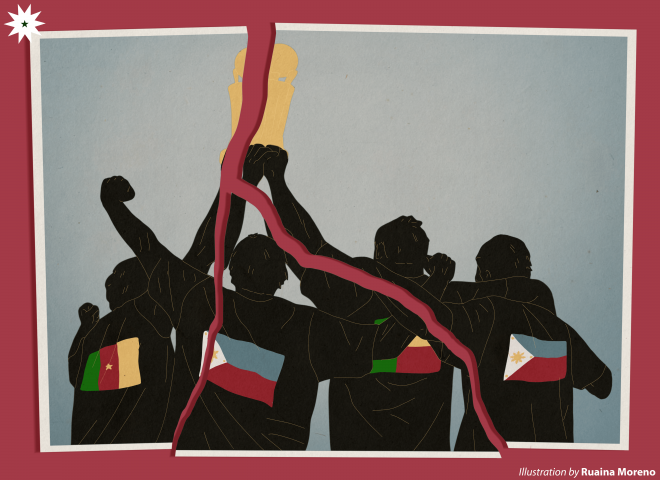After years of foreign players constantly dominating the collegiate basketball individual awards, House Deputy Speaker Mikee Romero has filed House Resolution 388, which seeks to ban foreign players from playing in collegiate leagues such as the UAAP and NCAA. In fact, the NCAA has already banned foreign players from playing in their league starting next year in its 96th season.
Romero explained that this change was because of the string of losses our national basketball team had suffered in China during the recent FIBA World Cup. Having foreigners play in the collegiate leagues, Romero argued, impedes the growth and development of various sports programs in the country. But in reality, foreign players have helped develop local players rather than hindered them. An example of this would be Green Archer Justine Baltazar, who stated in a recent interview with ABS-CBN that training with former UAAP Most Valuable Player (MVP) Ben Mbala helped him grow into the dominant big that he is today.
Moreover, San Beda head coach Boyet Fernandez expressed his own thoughts in a recent interview with CNN, citing how players such as Calvin Abueva and Ian Sanggalang were able to develop and elevate their skills in the professional stage because they played against the likes of Sudan Daniel and Donald Tankoua during their collegiate days.
With this, I believe that by banning the entrance of foreign athletes, we are robbing our players of a chance to play against international opposition on a regular basis. Sure, if you give a local player more minutes of playtime, their experience will certainly increase, but if you want to them to compete internationally, you have to expose them to competition at par with what they expect to face off against abroad, since this was the main reason they proposed this new rule.

A two-way street
When you ban a foreign player from playing in our leagues, you not only hinder them from showcasing their talents on a bigger stage, but you also deprive them of a college education they are entitled to. With foreign players, you are not only elevating your sports program by adding a talented athlete to your team, but you are also giving them the opportunity to set up their future.
With this new rule, people tend to forget that these players are students too, and just like us, they are seeking the best education they can possibly get through scholarships offered by universities. Who are we to deprive them of this, especially since in other countries, they allow Filipinos to thrive on their soil? Why can’t we do the same here? One prime example would be Kai Sotto, someone who is currently taking advantage of the different opportunities and trainings that the United States offers. If they allowed Sotto to grow and develop there, why can’t we do the same to athletes that look for those same opportunities here?
Nothing but greatness
In the past several UAAP Men’s Basketball seasons, the MVP awards have been bestowed upon foreign players, from Mbala in UAAP Seasons 79 and 80, to our current UAAP Season 82 MVP Soulemane Chabi Yo. This is also a trend in Women’s Basketball, with the current UAAP Season 82 MVP being Grace Eribu, a foreign player who hails from UST. Other people might see this as a prime example as to why we should ban them, but in my point of view, this is exactly why we need them.
These awards are representations of the level of talent and skill these players have, as the MVP award is given to the player that has made the highest impact on the team they represent, both statistically and in the win column. With that being said, if they do provide this sort of impact on their teams and the teams they go against, then instead of looking at these like it’s a bad thing, we should be able to see this as a challenge for us Filipinos, especially if our main goal is to succeed internationally.
These players have done nothing but good to their respective sports. From Mbala spearheading the Green Archers to a championship and a finals appearance, to Angelo Kouame being a huge part of two of Ateneo’s three consecutive titles, and finally to Chabi Yo leading UST to an improbable finals appearance, these foreign-athletes have provided exceptional results and performances for their respective universities that go way beyond the hardcourt.
It’s disappointing to see that in a country where we pride ourselves with passion and love for the sport, we would not want to share and showcase that passion with other members of the world. Having them experience it first hand not only exposes them to the world, but also to our leagues.
Sports is more than just a game. For these students, sports offer an avenue toward even greater opportunities in their future. We should not deprive them of those possible opportunities, and rather appreciate what they give us through their talents.
